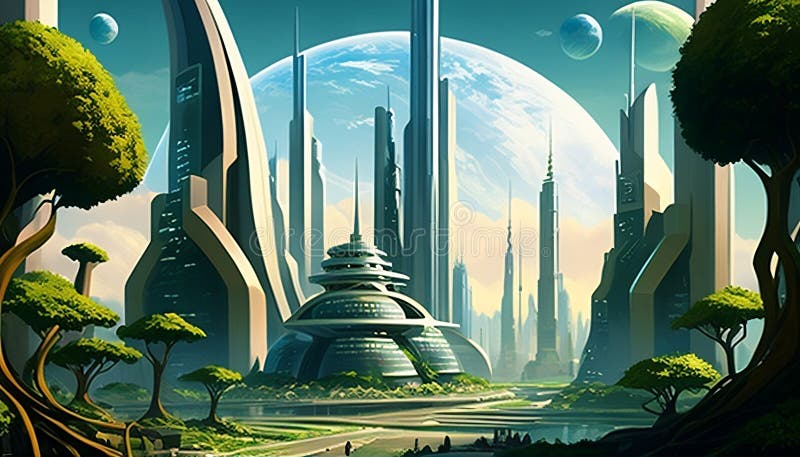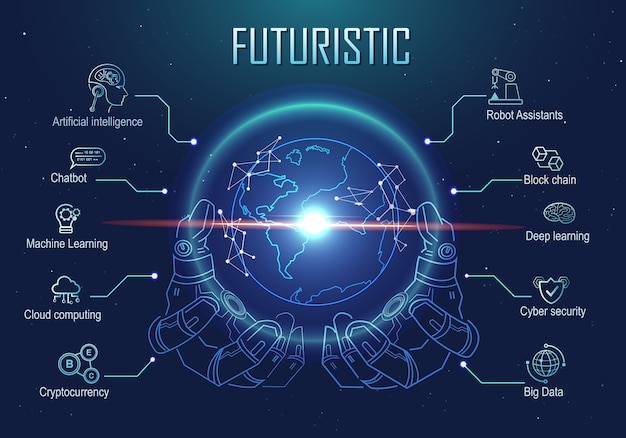Icons Of The Future: A Glimpse Into A World Transformed
Icons of the Future: A Glimpse into a World Transformed
Icons of the Future: A Glimpse into a World Transformed
Introduction
With enthusiasm, let’s navigate through the intriguing topic related to Icons of the Future: A Glimpse into a World Transformed. Let’s weave interesting information and offer fresh perspectives to the readers.
Table of Content
Icons of the Future: A Glimpse into a World Transformed
![]()
The future, once a realm of science fiction, is rapidly becoming our present. Technological advancements, societal shifts, and environmental concerns are shaping a world vastly different from the one we know. Understanding these forces requires recognizing the icons that represent this evolving landscape, providing a framework for navigating the complexities of the future.
1. Artificial Intelligence: The Mind of the Machine
Artificial Intelligence (AI) stands as a defining icon of the future, representing the burgeoning power of machines to think and learn. From self-driving cars to personalized healthcare, AI’s influence is pervasive. It automates tasks, analyzes data with unprecedented speed and accuracy, and even creates art and music. While AI raises ethical concerns regarding job displacement and bias, its potential for solving complex problems, from climate change to disease eradication, is undeniable.
2. Biotechnology: Redefining Life Itself
Biotechnology, encompassing genetic engineering, synthetic biology, and bioprinting, is poised to revolutionize healthcare and redefine our understanding of life. Gene editing holds the promise of curing inherited diseases, while bioprinting enables the creation of organs and tissues, offering hope for organ transplantation and regenerative medicine. The ethical implications of manipulating life at the genetic level are profound, requiring careful consideration and regulation.
3. Renewable Energy: Powering a Sustainable Future
The relentless pursuit of sustainable energy sources, particularly solar, wind, and hydro, is another crucial icon of the future. The transition from fossil fuels to renewable energy is essential for mitigating climate change and ensuring a livable planet. The development of energy storage technologies, such as batteries and hydrogen fuel cells, is crucial for overcoming the intermittent nature of renewable energy sources.
4. Space Exploration: Expanding Horizons
The human fascination with space exploration continues to drive technological advancements and inspire new frontiers. Private companies are joining government agencies in pushing the boundaries of space travel, with ambitious plans for lunar bases, Mars colonization, and the search for life beyond Earth. Space exploration fosters innovation in various fields, from materials science to communication technology.
5. Virtual and Augmented Reality: Blending Reality and Imagination
Virtual Reality (VR) and Augmented Reality (AR) blur the lines between the physical and digital worlds, creating immersive experiences that have the potential to transform entertainment, education, and even healthcare. VR immerses users in simulated environments, while AR overlays digital information onto the real world. These technologies are poised to revolutionize the way we learn, work, and interact with the world around us.
6. The Internet of Things: A Connected World
The Internet of Things (IoT) refers to the interconnectedness of physical devices, vehicles, and other objects, enabling them to communicate and share data. From smart homes to connected cities, IoT is creating a world where data flows seamlessly, optimizing efficiency and creating new possibilities. The potential benefits of IoT are vast, but also require careful consideration of security and privacy concerns.
7. The Sharing Economy: A Collaborative Future
The sharing economy, characterized by peer-to-peer platforms for sharing resources like transportation, accommodation, and goods, is transforming traditional business models and fostering a more collaborative and sustainable society. This shift towards shared ownership and access promotes resource optimization and reduces environmental impact.
8. Climate Change: The Defining Challenge
Climate change, with its devastating consequences, serves as a stark reminder of the interconnectedness of our planet and the urgency for action. The future will be defined by our ability to address this challenge, requiring innovative solutions in energy, agriculture, and infrastructure.
FAQs by Icons that Represent the Future:
1. Artificial Intelligence:
- Q: What are the potential risks associated with AI?
- A: AI raises ethical concerns about job displacement, bias in algorithms, and the potential for malicious use.
- Q: How can we ensure the ethical development and use of AI?
- A: Establishing ethical guidelines, promoting transparency in AI development, and fostering public dialogue are crucial steps.
2. Biotechnology:
- Q: What are the ethical considerations surrounding gene editing?
- A: The potential for unintended consequences, the risk of creating genetic inequalities, and the right to bodily autonomy are complex ethical issues.
- Q: How can we ensure equitable access to the benefits of biotechnology?
- A: Addressing affordability, ensuring equitable distribution of resources, and preventing the creation of a two-tiered healthcare system are essential.
3. Renewable Energy:
- Q: What are the challenges in transitioning to renewable energy?
- A: The intermittent nature of renewable energy sources, the need for efficient energy storage, and the cost of transitioning to a new energy infrastructure are key challenges.
- Q: How can we overcome these challenges?
- A: Investing in research and development of energy storage technologies, fostering public-private partnerships, and implementing policies that incentivize renewable energy adoption are crucial.
4. Space Exploration:
- Q: What are the benefits of space exploration?
- A: Space exploration drives technological innovation, fosters international collaboration, and inspires future generations.
- Q: What are the ethical considerations surrounding space exploration?
- A: The potential for environmental damage, the equitable distribution of resources, and the potential for conflict in space are complex ethical issues.
5. Virtual and Augmented Reality:
- Q: What are the potential applications of VR and AR?
- A: VR and AR have applications in entertainment, education, healthcare, training, and design.
- Q: What are the potential risks associated with VR and AR?
- A: The potential for addiction, the risk of cyberbullying, and the potential for misuse in manipulating people are concerns.
6. The Internet of Things:
- Q: How can we ensure the security of IoT devices?
- A: Strong encryption, regular software updates, and robust security protocols are crucial for protecting IoT devices from hacking and data breaches.
- Q: How can we address the privacy concerns associated with IoT?
- A: Transparency in data collection, user control over data sharing, and robust privacy regulations are essential.
7. The Sharing Economy:
- Q: What are the potential benefits of the sharing economy?
- A: The sharing economy promotes resource optimization, reduces waste, and fosters a more collaborative society.
- Q: What are the challenges of the sharing economy?
- A: Ensuring fair competition, addressing regulatory issues, and ensuring worker rights are crucial challenges.
8. Climate Change:
- Q: What are the most effective strategies for mitigating climate change?
- A: Investing in renewable energy, improving energy efficiency, reducing deforestation, and transitioning to sustainable agriculture are key strategies.
- Q: How can we adapt to the impacts of climate change?
- A: Building resilient infrastructure, developing drought-resistant crops, and implementing early warning systems for extreme weather events are crucial.
Tips by Icons that Represent the Future:
1. Embrace Technological Advancements: The future belongs to those who embrace technology, adapt to its rapid pace, and leverage its potential for good.
2. Prioritize Sustainability: Sustainable practices, from reducing waste to conserving energy, are essential for building a future that can thrive.
3. Foster Collaboration: Collaboration across disciplines, industries, and borders is crucial for solving the complex challenges of the future.
4. Embrace Ethical Responsibility: As technology advances, ethical considerations become increasingly important. Prioritizing ethical principles in decision-making is crucial.
5. Encourage Innovation: The future is built on innovation. Supporting research, development, and entrepreneurship is essential for driving progress.
6. Educate and Empower: Investing in education and empowering individuals with the knowledge and skills necessary to thrive in a rapidly changing world is critical.
Conclusion by Icons that Represent the Future:
The icons of the future represent not only technological advancements but also a profound shift in human values, priorities, and aspirations. Navigating this evolving landscape requires a commitment to innovation, sustainability, collaboration, and ethical responsibility. By embracing these values, we can shape a future that is not only technologically advanced but also equitable, sustainable, and fulfilling for all.








Closure
Thus, we hope this article has provided valuable insights into Icons of the Future: A Glimpse into a World Transformed. We thank you for taking the time to read this article. See you in our next article!